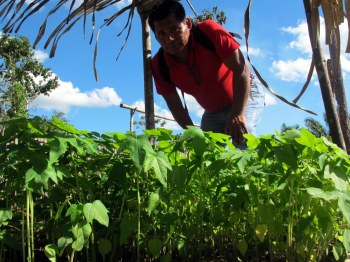Intercultural school director, Luis Marquez, with his students from Puerta Firmeza
Luis Marquez is the Shipibo director and visionary behind the intercultural school that Alianza Arkana is funding in the Shipibo community of Puerto Firmeza. Luis was born in a time when bilingual, intercultural education did not exist, and he grew up ashamed of his traditions and his language. He had all but denounced his culture when he had the opportunity to be a part of AIDESEP´s five-year ground-breaking FORMABIAP intercultural education program to learn to be an intercultural educator. During this program, Luis rediscovered his indigenous identity, and was determined to give Shipibo youth the opportunity he did not have.
Since graduating from the teacher training program in 1992, he has had 20 years of experience working in the Peruvian educational system in a variety of roles: as a teacher, a trainer of teachers, Director of the Instituto Superior Pedagógico in Pucallpa (the principal teacher training organization in the region) and working as a specialist in the Ministry of Education and other local and regional educational bodies. However, in these experiences, he found that a genuine intercultural education, although mandated by Peruvian law, does not in fact exist. Instead, a Western education is given in the Shipibo language, teaching nothing of indigenous culture or cosmovision. He became frustrated as he found that his students felt the same shame about their culture that he had felt.
In 2007, he decided that rather than continuing his career as a high-level administrator, he would rather be more directly involved in creating a more authentic community-based model of intercultural education for Shipibo youth so that they could become knowledgeable and proud of their culture and traditions, and accepted the post of Director of a community school at Puerto Firmeza.
Luis´s vision for the school is to provide a Western education that is balanced with a rich teaching in Shipibo culture. This will be achieved by the creation of eight distinct educational zones in the school that include the learning of traditional art forms and healing practices, planting of medicinal plants, food forest, a fish farm, etc.
However, while Luis is an excellent teacher, he did not have the technical information to implement these nature based educational zones that require expertise in permaculture, sustainable agriculture, etc. He found that he was not attracting sufficient support from the community.
 Marcos Urquia, a Shipibo permaculture specialist, working in Puerta Firmeza
Marcos Urquia, a Shipibo permaculture specialist, working in Puerta Firmeza
Meet Marcos Urquia. Marcos is a Shipibo permaculture specialist trained at the Instituto de Permacultura de la Amazonia in Manaus, Brazil. Marcos has been working with permaculture design for more than fifteen years in the Peruvian Amazon.
When Marcos and Luis first met it was clear that they would be a great team. Luis, with his passion and brilliance for teaching, and Marcos, with his commitment and skill in permaculture, have come together to bring about the student and community support needed to make the vision for the school a reality.
Suddenly, Luis felt a wave of extra support come from the community thanks to Marcos, and thanks to Luis, Marcos found that his permaculture ideas were being conveyed and understood by the community.
¨We are a duo,¨ Luis told me in a recent meeting ¨I was never very good at teaching these ideas to others before,¨ said Marcos, ¨…and I didn´t have the technical knowledge to implement them,¨ Luis added.
But together, Marcos and Luis show us that the whole is greater than the sum of its parts. They are making the Puerta Firmeza school a true intercultural institution that will not only benefit its students by offering them a profound grounding in the beliefs, legends, traditions, customs, art-forms, traditional plant medicines, agricultural and artisanal practices of their culture, but all of the community, through food production and a more sustainable way of life.
Monday, 21 May 2012

